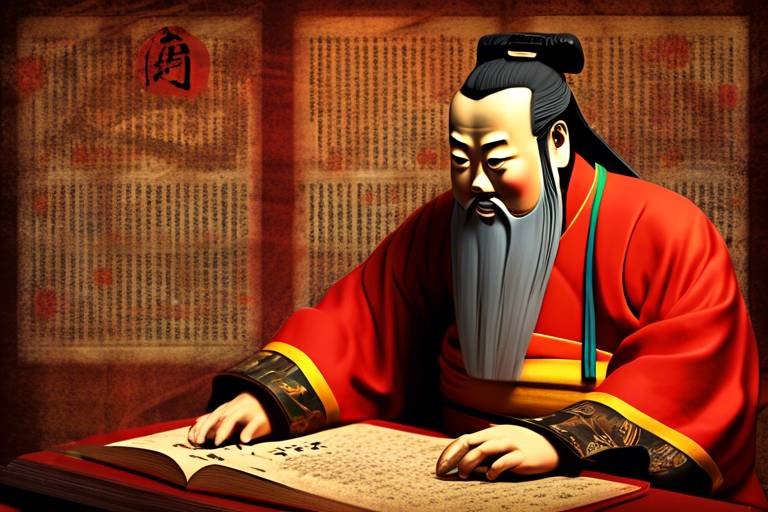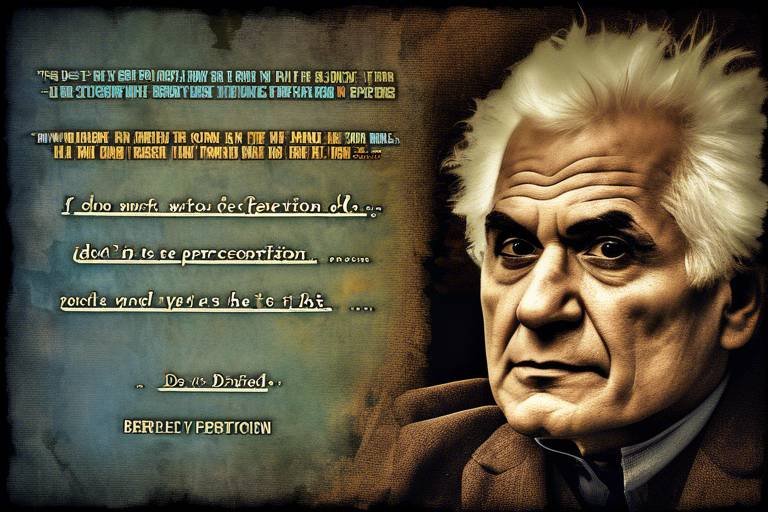Evaluating the Philosophical Contributions of Confucius
Confucius, a name that resonates through the ages, is more than just a historical figure; he is a beacon of ethical thought and moral philosophy. Born in 551 BCE in the state of Lu, Confucius lived during a time of great social upheaval and political instability in ancient China. His teachings, which focus on ethics, politics, and education, have left an indelible mark on Chinese culture and beyond, shaping the way we think about personal conduct and governance even in our modern world. But what is it about his philosophy that continues to capture the imagination of so many? Let's dive into the profound influence of Confucius, exploring his core teachings and their relevance today.
To fully appreciate Confucius's contributions, it's essential to understand the historical backdrop of his time. The era was characterized by the Warring States Period, a time of fragmentation and chaos among the various states of China. This socio-political landscape posed significant challenges, prompting Confucius to seek solutions through his teachings. He believed that the restoration of social harmony could be achieved through a return to moral values and ethical governance. In a society where might often made right, Confucius proposed that virtue and education could lead to a more just and stable world.
At the heart of Confucian philosophy lie several core teachings that emphasize the importance of virtues such as benevolence, righteousness, and propriety. These principles form the foundation of his ethical system, which advocates for a life of moral integrity and social responsibility. For Confucius, the cultivation of personal virtues was not merely an individual endeavor; it was essential for the well-being of society as a whole. He argued that a virtuous individual could inspire others, creating a ripple effect that would ultimately lead to a harmonious community.
One of the most significant concepts in Confucian thought is Ren, often translated as "humaneness" or "benevolence." This principle underscores the importance of compassion and empathy in human interactions. Confucius believed that Ren is the essence of being human, and it should guide our personal conduct and relationships. Imagine Ren as the glue that binds society together—without it, our connections would be fragile and superficial. By practicing Ren, individuals can foster a sense of community and belonging, which is essential for societal harmony.
When we explore how Ren influences interpersonal relationships, we see that it encourages individuals to act with empathy and kindness. Confucius taught that by treating others with respect and compassion, we can build stronger social bonds. Think of it like planting seeds in a garden; when you nurture them with care, they flourish and grow. Similarly, when we practice Ren in our relationships, we create an environment where trust and understanding can thrive.
Confucius's principle of Ren also extends to governance. He advocated for leaders to embody moral integrity and prioritize the welfare of the people. For Confucius, a ruler who practices Ren is not just a figurehead but a moral exemplar who inspires loyalty and devotion among the populace. In this way, Ren serves as a guiding principle for ethical governance, suggesting that the best leaders are those who genuinely care for their citizens and act in their best interests.
Another crucial aspect of Confucian philosophy is the concept of Li, which refers to rituals and proper conduct. Li plays a vital role in promoting social order and cultural identity. Confucius believed that rituals are not merely formalities; they are essential for expressing respect, maintaining harmony, and reinforcing social bonds. By adhering to Li, individuals can cultivate a sense of community and continuity, bridging the past with the present.
Education is a pivotal theme in Confucian thought. Confucius viewed learning as a lifelong journey, essential for both personal and societal development. He believed that through education, individuals could cultivate their virtues and contribute positively to society. This perspective underscores the idea that education is not just about acquiring knowledge but also about shaping character and moral integrity.
Confucius strongly advocated for moral education, emphasizing that the cultivation of virtue is fundamental to individual character and societal well-being. He believed that teaching ethics and morality should be an integral part of the educational system. Just as a tree needs strong roots to grow tall and healthy, individuals require a solid moral foundation to thrive in life. By instilling these values in students, we can cultivate a generation of responsible and ethical citizens.
Today, Confucius's impact on contemporary educational practices is undeniable. His legacy lives on in the promotion of critical thinking, ethical reasoning, and character development in students. Schools around the world incorporate elements of his philosophy, encouraging students to not only excel academically but also to become compassionate and responsible members of society. In this way, Confucius's teachings continue to inspire educators and students alike, reminding us of the profound connection between education and moral development.
- What is the main philosophy of Confucius? Confucius's philosophy centers around ethics, virtue, and the importance of moral education in creating a harmonious society.
- How does Confucius's teaching relate to modern society? His teachings emphasize values such as empathy, respect, and integrity, which remain relevant in today's world.
- What role do rituals play in Confucianism? Rituals, or Li, are seen as essential for maintaining social order and expressing respect within a community.

Historical Context of Confucius
The life of Confucius, who lived from 551 to 479 BCE, unfolded during a tumultuous period in Chinese history known as the **Spring and Autumn Period**. This era was marked by significant **political fragmentation**, social upheaval, and moral decline. Various states were vying for power, leading to constant warfare and instability. In this chaotic environment, Confucius emerged as a beacon of hope, advocating for a return to **traditional values** and ethical governance.
Confucius was born in the state of Lu, a region that was part of modern-day Shandong province. His early life was shaped by the **conflicts** and **political intrigues** surrounding him. As a young man, he experienced firsthand the **inequities** and **corruption** prevalent in society. These experiences deeply influenced his thoughts and teachings, prompting him to seek a way to restore harmony and order. He believed that the key to achieving this lay in the cultivation of virtue and moral integrity among both individuals and rulers.
During Confucius's lifetime, the **feudal system** was crumbling, and the **mandate of heaven**—the divine right to rule—was increasingly questioned. This context led to a growing disillusionment with traditional authority figures, creating a fertile ground for Confucian ideas to take root. His philosophy was not merely a response to the chaos of his time but also a **vision for a better future**, where ethical leadership and moral education could foster a more harmonious society.
Confucius's teachings emphasized the importance of **social relationships** and **community**. He proposed that a well-ordered society relies on the proper conduct of individuals within their various roles, such as parent, child, ruler, and subject. This idea of **reciprocal relationships** was revolutionary, suggesting that personal conduct could directly impact societal stability. His focus on **benevolence** (Ren) and **ritual propriety** (Li) aimed to cultivate a moral framework that would guide individuals in fulfilling their roles responsibly.
Moreover, Confucius's philosophy was deeply intertwined with the **cultural identity** of China. He advocated for the revival of ancient rituals and traditions, which he believed were essential for maintaining social order. Through the practice of rituals, individuals could express their respect for their ancestors and the state, thereby reinforcing the moral fabric of society. Confucius’s teachings provided a means to bridge the past with the present, offering a framework that could adapt to the changing realities of his time while preserving the essence of Chinese culture.
In summary, the historical context of Confucius's life was critical in shaping his philosophical contributions. The **socio-political challenges** of the Spring and Autumn Period not only influenced his thoughts but also highlighted the relevance of his teachings in addressing the moral crises of his time. Confucius's vision for a harmonious society, rooted in virtue and ethical governance, continues to resonate today, reminding us of the enduring power of philosophy in navigating the complexities of human existence.
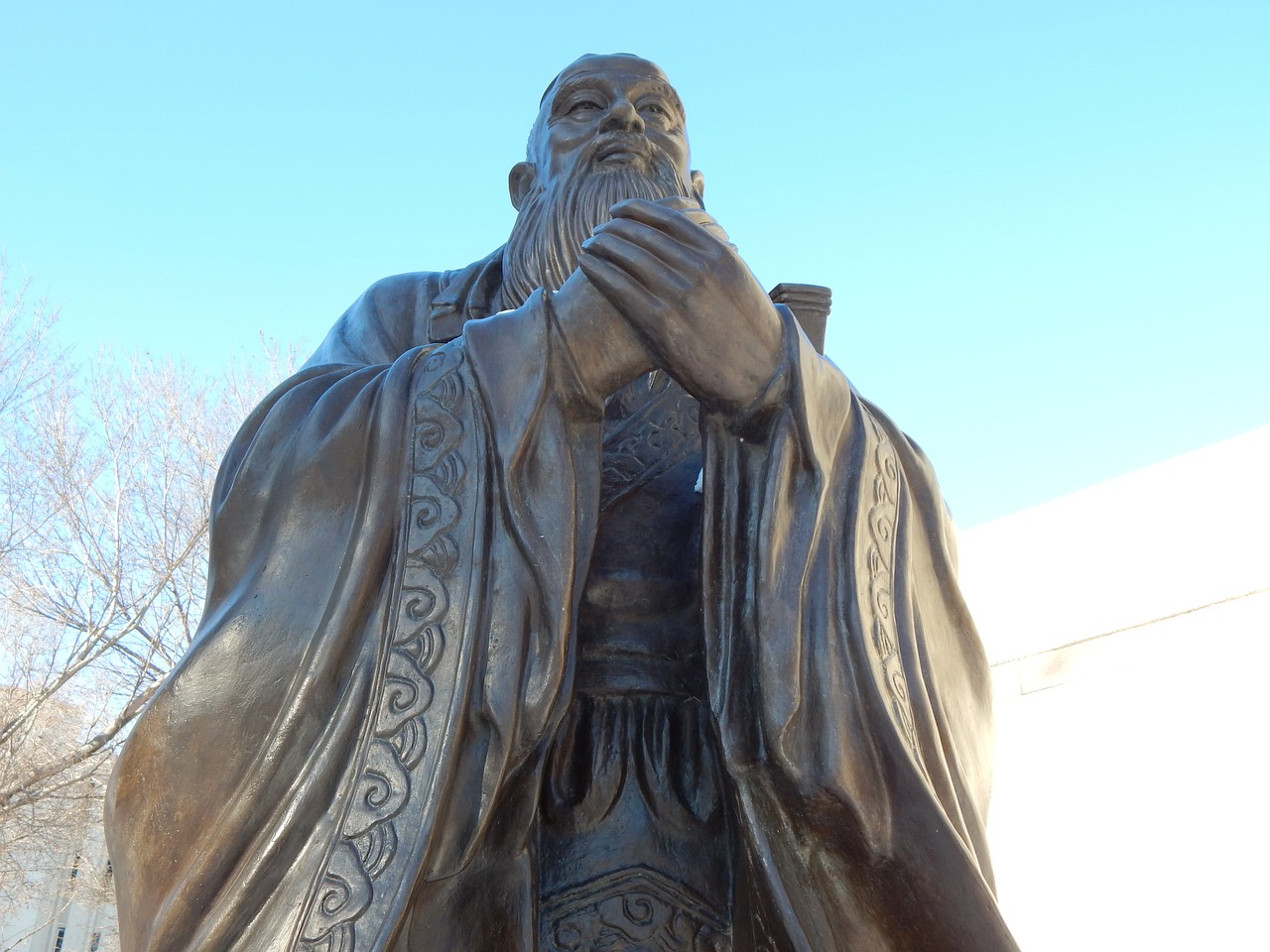
Core Teachings of Confucius
Confucius, a name that resonates through the ages, is celebrated not just as a philosopher but as a beacon of ethical conduct and moral integrity. His teachings, rooted in the tumultuous socio-political landscape of ancient China, offer profound insights that are still remarkably relevant today. At the heart of Confucian philosophy lie several core teachings that emphasize virtues such as benevolence, righteousness, and propriety. These virtues form the bedrock of his ethical system, shaping individual behavior and societal norms alike.
One of the most significant aspects of Confucius's teachings is the concept of Ren, often translated as "humaneness" or "benevolence." This idea is not merely about being kind; it’s about cultivating a deep sense of empathy and compassion for others. Imagine a world where every interaction is guided by a genuine concern for the well-being of others. Ren encourages individuals to look beyond their own needs and desires, fostering a sense of community and interconnectedness. In a society where Ren is practiced, relationships thrive, and conflicts diminish, creating a harmonious environment.
Furthermore, Confucius emphasized the importance of Li, or rituals, which play a crucial role in maintaining social order and cultural identity. These rituals are not just ceremonial; they embody the values and traditions that bind a community together. By engaging in Li, individuals express respect for their ancestors, their culture, and each other. This connection to tradition serves as a stabilizing force, reminding us of our roots and the responsibilities we have towards one another. In essence, Li is about understanding the weight of our actions and their impact on the broader society.
Confucius's teachings extend beyond personal conduct to encompass governance as well. He believed that leaders should embody moral integrity and prioritize the welfare of the people. A ruler guided by Ren would not only seek to maintain power but would also strive to uplift and nurture the populace. This notion of ethical governance is crucial in today’s world, where leaders are often scrutinized for their decisions. The idea that a leader should be a moral exemplar resonates strongly, reminding us that true authority comes from virtue rather than coercion.
In summary, the core teachings of Confucius are not just ancient wisdom; they are a call to action for contemporary society. By embracing the principles of Ren and Li, we can foster stronger relationships, promote ethical governance, and cultivate a culture of respect and compassion. As we navigate the complexities of modern life, these teachings serve as a guiding light, urging us to reflect on our actions and their implications for both ourselves and the world around us.
- What is the significance of Ren in Confucianism?
Ren, or humaneness, is central to Confucian thought, emphasizing empathy and compassion in personal conduct and societal relations. - How do Li and Ren work together?
Li, or rituals, complements Ren by providing a framework for social interactions, ensuring that they are conducted with respect and integrity. - Can Confucian teachings be applied today?
Absolutely! Confucian principles of morality and ethical governance are highly relevant in addressing contemporary social and political challenges.

The Concept of Ren
The concept of Ren, often translated as "humaneness" or "benevolence," is the cornerstone of Confucian philosophy. It encapsulates the essence of what it means to be human and serves as a guiding principle for personal behavior and societal interaction. Imagine a world where kindness and empathy are not just ideals but practiced norms—this is the vision Confucius had in mind. Ren is not merely a passive feeling; it requires action and commitment. It is about how we treat others and how we see ourselves in relation to the community.
At its core, Ren emphasizes the importance of empathy and compassion. Confucius believed that true humaneness comes from understanding and responding to the needs of others, promoting a sense of interconnectedness. This principle is not just about individual relationships; it extends to the broader society, advocating for a harmonious community where everyone plays a role in uplifting one another. In many ways, Ren can be viewed as the social glue that binds individuals together, fostering a sense of belonging and mutual respect.
To better understand how Ren manifests in daily life, consider the following aspects:
- Empathy: The ability to put oneself in another's shoes and feel their emotions.
- Compassion: Acting on that empathy by helping those in need.
- Respect: Valuing others' feelings and opinions, regardless of differences.
In personal relationships, Ren encourages individuals to cultivate strong bonds based on trust and understanding. It is about being there for friends and family, showing support during tough times, and celebrating their successes. This nurturing approach not only strengthens individual relationships but also contributes to a more cohesive society. When people practice Ren, they create an environment where kindness is reciprocated, leading to a cycle of goodwill and mutual support.
Moreover, Ren's influence extends beyond personal interactions; it plays a significant role in governance. Confucius argued that leaders should embody Ren, prioritizing the welfare of their people above personal interests. A ruler who practices humaneness is more likely to inspire loyalty and respect among their subjects. This idea is especially relevant today, as we seek leaders who demonstrate moral integrity and a genuine concern for the public good. The principle of Ren, therefore, serves as a timeless reminder that ethical leadership is rooted in compassion and empathy.
In summary, the concept of Ren is integral to Confucianism, emphasizing the importance of humaneness in both personal conduct and governance. By embodying Ren, individuals contribute to a more just and harmonious society, proving that the teachings of Confucius remain relevant even in our modern world.
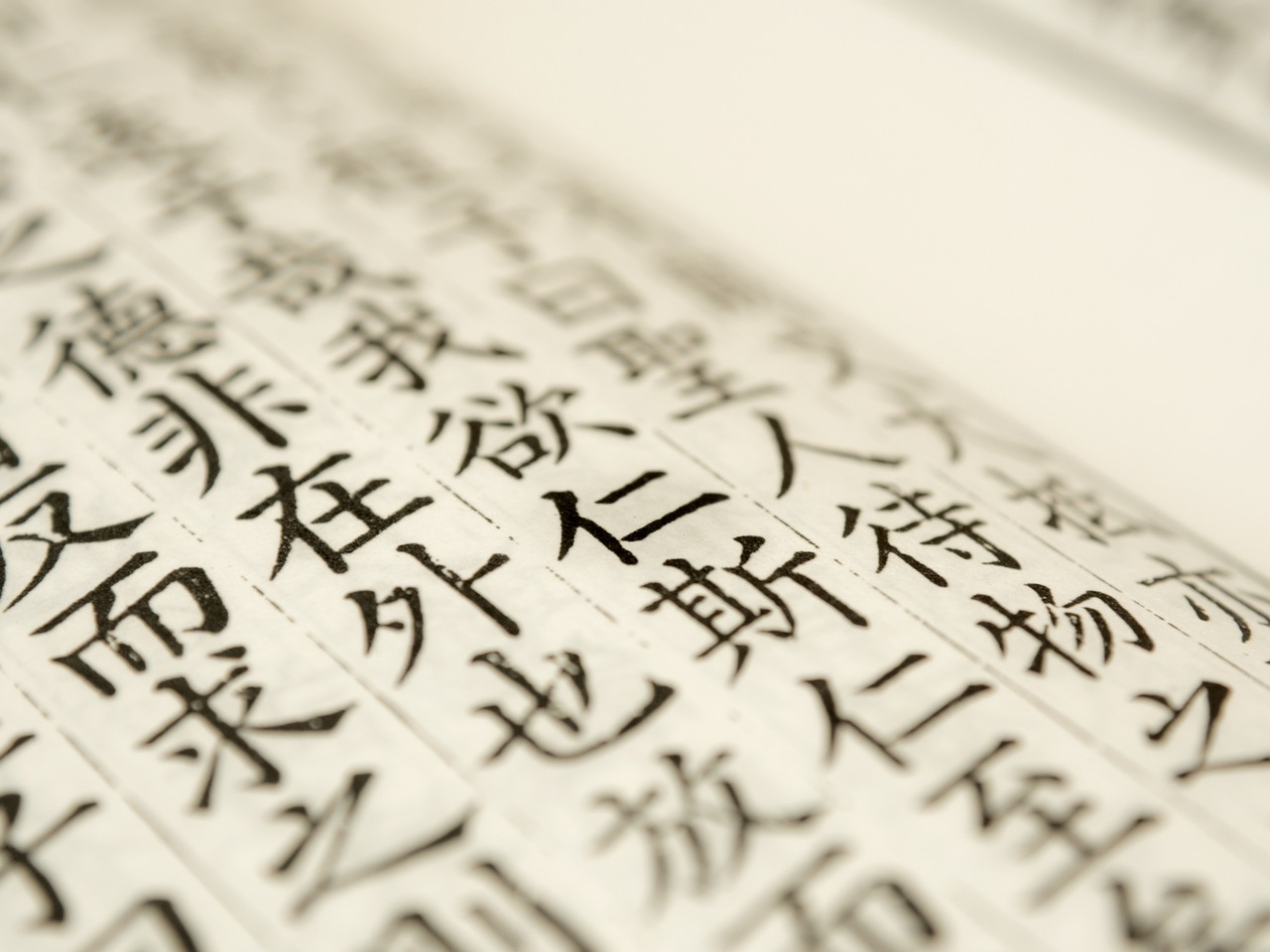
Ren in Personal Relationships
When we talk about Ren, or humaneness, in personal relationships, we're diving into a concept that resonates deeply with how we connect with one another. Imagine a world where empathy reigns supreme, where understanding and compassion guide our interactions. This is precisely what Confucius envisioned with Ren. At its core, Ren encourages us to treat others with kindness and respect, fostering an environment where relationships can flourish.
In practice, embodying Ren means actively listening to others, valuing their perspectives, and responding with compassion. It’s about seeing the humanity in everyone, recognizing that each person has their own struggles, joys, and stories. This mindset not only strengthens our bonds but also cultivates a sense of community. In Confucian philosophy, relationships are not merely transactional; they are the bedrock of a harmonious society.
Consider how Ren manifests in different types of relationships:
- Family Relationships: Within families, practicing Ren means prioritizing the well-being of each member. It encourages parents to lead with love and understanding, while children are taught to respect and care for their elders.
- Friendships: In friendships, Ren fosters loyalty and support. Friends who embody Ren are there for each other through thick and thin, offering a shoulder to cry on or a helping hand when needed.
- Workplace Interactions: In a professional setting, embracing Ren can transform workplace dynamics. It promotes collaboration over competition, encouraging colleagues to uplift one another and work towards common goals.
Moreover, Ren is not just a passive feeling; it requires action. Confucius believed that we should strive to express our humaneness through our deeds. Small acts of kindness, like checking in on a friend in need or offering assistance to a colleague, can have a ripple effect, inspiring others to do the same. This creates a culture of mutual respect and support, which is essential for any thriving community.
Ultimately, the practice of Ren in personal relationships is about building a foundation of trust and understanding. It’s about creating a safe space where individuals feel valued and heard. When we embody Ren, we not only enhance our own lives but also contribute positively to the lives of others, fostering a sense of belonging and interconnectedness. In a society that often feels fragmented, the principles of Ren remind us of the importance of compassion and empathy in nurturing our most important connections.
- What is Ren in Confucian philosophy? Ren, or humaneness, is a core concept in Confucianism that emphasizes empathy, kindness, and compassion in human interactions.
- How can I practice Ren in my daily life? You can practice Ren by actively listening to others, showing kindness, and being supportive in your relationships.
- Why is Ren important in personal relationships? Ren fosters strong bonds and creates a sense of community, promoting harmony and understanding among individuals.
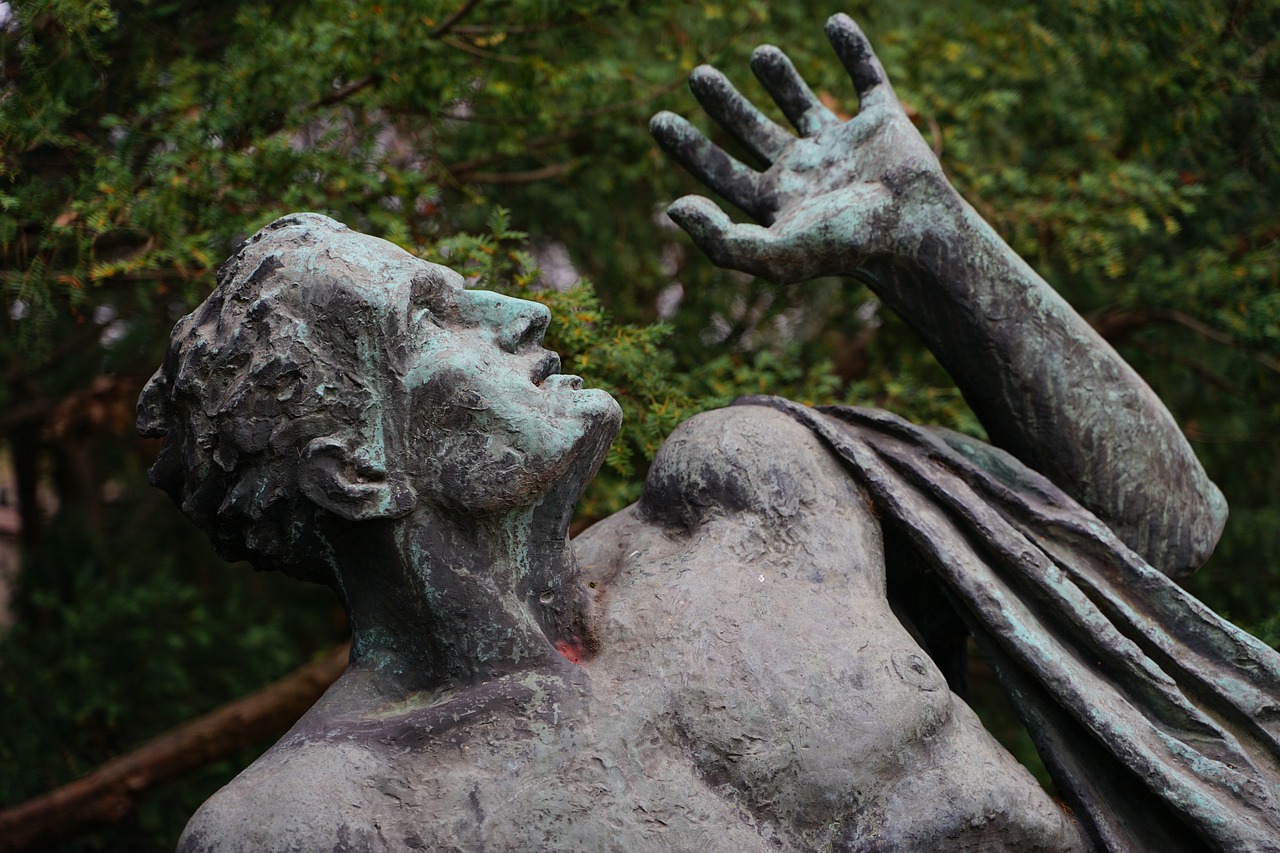
Ren and Governance
In the realm of governance, the principle of Ren (仁), often translated as humaneness or benevolence, holds significant weight in Confucian philosophy. Confucius believed that a ruler's moral integrity is paramount for effective governance. Imagine a ship at sea: if the captain is morally sound, the ship sails smoothly. However, if the captain is self-serving, the ship is likely to capsize. This analogy underscores how leaders embodying Ren can steer their societies toward harmony and prosperity.
Confucius argued that leaders should prioritize the welfare of their people, viewing governance as a form of service rather than a means of personal gain. This approach fosters a sense of trust and loyalty between the government and its citizens. When rulers act with compassion and empathy, they create a social fabric that encourages cooperation and respect. In essence, the ruler’s moral character directly influences the moral climate of the entire society.
Moreover, the integration of Ren in governance involves several key aspects:
- Empathy: Leaders should strive to understand the needs and struggles of their people, creating policies that reflect their concerns.
- Integrity: A government that operates with transparency and honesty builds public trust, which is essential for a stable society.
- Service Orientation: Governance should be seen as a duty to the people, emphasizing support and upliftment rather than control and oppression.
Confucius’s vision of governance advocates for a moral ruler who acts as a role model. This idea resonates in contemporary discussions about leadership, where ethical governance is increasingly seen as crucial for sustainable development. Leaders today can learn from Confucian principles by fostering an environment where morality and ethics guide decision-making processes. By doing so, they can cultivate a society that not only survives but thrives on mutual respect and understanding.
In conclusion, the application of Ren in governance is not merely an ancient concept but a timeless principle that can lead to effective leadership and a harmonious society. As we navigate the complexities of modern governance, the teachings of Confucius remind us that at the heart of leadership lies a fundamental duty to care for and uplift our communities.
- What is Ren in Confucianism? Ren is a key concept in Confucian philosophy that emphasizes humaneness, compassion, and empathy in personal conduct and governance.
- How does Ren influence leadership? Leaders who embody Ren prioritize the welfare of their people, fostering trust and loyalty, which is essential for effective governance.
- Can the principles of Confucian governance be applied today? Yes, the principles of Ren and ethical leadership remain relevant and can guide modern leaders in creating a more just and harmonious society.

The Role of Rituals (Li)
In the tapestry of Confucian philosophy, the concept of Li, or rituals, weaves through the fabric of social order and personal conduct. Rituals in Confucianism are not mere formalities; they embody the values and ethics that govern human interactions. Li encompasses a broad spectrum of practices—from daily manners to grand ceremonies—aiming to cultivate respect and harmony within society. Imagine a world where every interaction is steeped in respect and tradition; this is the essence of Li.
At its core, Li serves multiple purposes. It acts as a social glue, binding individuals together through shared practices and beliefs. These rituals foster a sense of belonging and identity, allowing people to connect with their community and heritage. For instance, traditional ceremonies such as weddings or funerals are not just events; they are profound expressions of cultural values and familial bonds. Through these rituals, individuals learn the importance of respect, honor, and reciprocity.
Moreover, Li plays an essential role in maintaining social harmony. By adhering to established rituals, individuals can navigate complex social situations with grace and poise. This structured approach to interaction reduces the likelihood of conflict and misunderstanding. Think of it as a dance; when everyone knows the steps, the performance flows smoothly. In this way, Li helps create a more cohesive and harmonious society.
In addition to promoting social order, Li also emphasizes the importance of self-cultivation. Engaging in rituals encourages individuals to reflect on their actions and intentions, fostering a deeper understanding of their role within the community. Through the practice of Li, one learns to embody virtues such as respect, integrity, and empathy. This process of self-reflection is vital for personal growth and moral development.
To further illustrate the significance of Li, consider the following key aspects:
| Aspect | Description |
|---|---|
| Social Cohesion | Rituals promote unity and shared identity within a community. |
| Conflict Resolution | Established rituals provide a framework for navigating disagreements. |
| Personal Growth | Participation in rituals encourages self-reflection and moral development. |
In contemporary society, the relevance of Li persists, albeit in different forms. While some may view rituals as outdated, they remain essential in fostering connections and maintaining cultural heritage. Whether it’s through family gatherings, community events, or even workplace protocols, the principles of Li continue to guide human interactions. By understanding and appreciating the role of rituals, we can cultivate a more respectful and harmonious world.
- What are some examples of Li in everyday life? Rituals can be as simple as greeting someone politely or as complex as wedding ceremonies, both of which embody respect and tradition.
- How can Li improve personal relationships? By adhering to rituals, individuals can foster mutual respect and understanding, strengthening their bonds with others.
- Is Li relevant in modern society? Absolutely! While the forms may change, the underlying principles of Li help maintain social order and cultural identity.
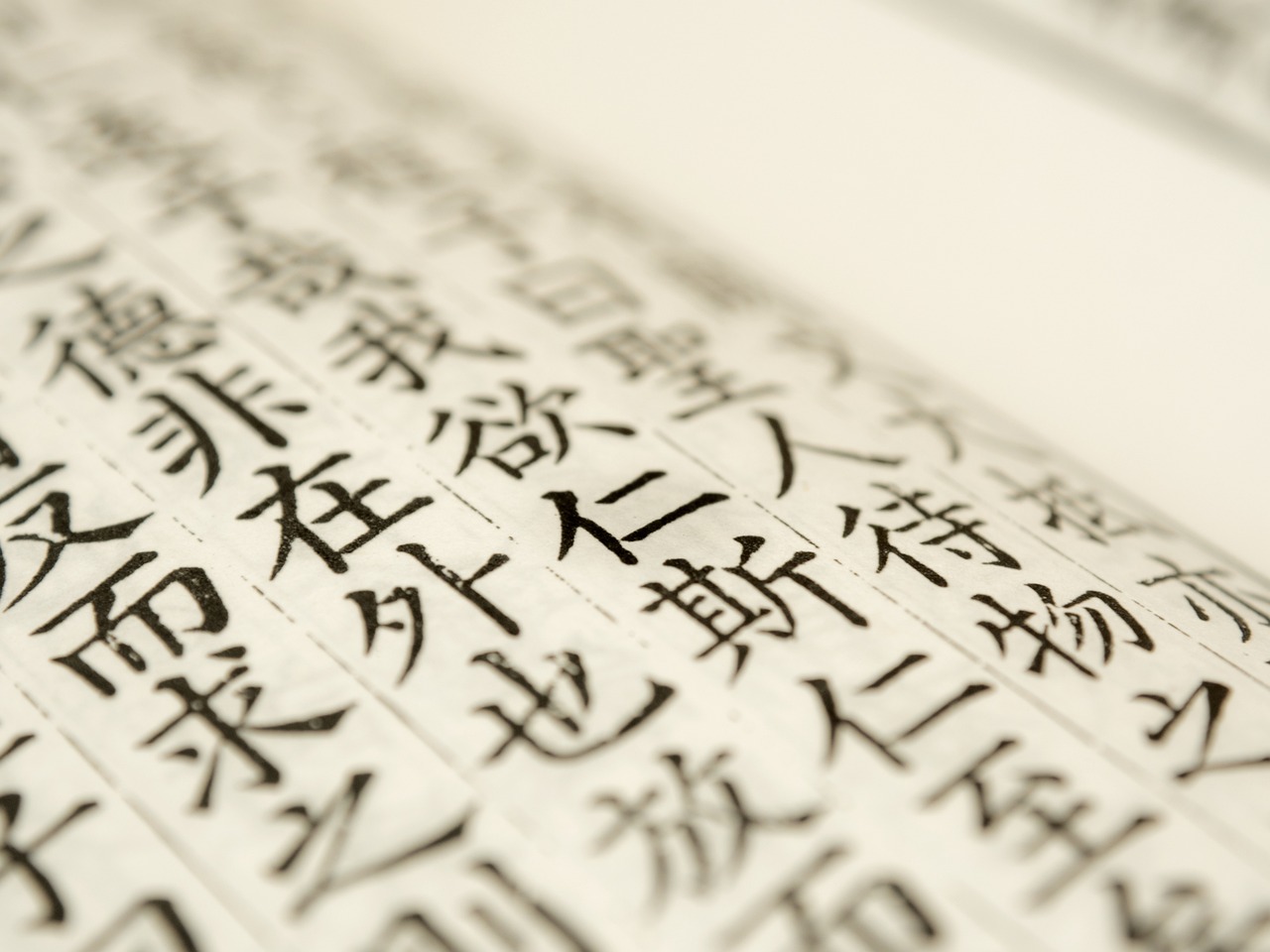
Confucianism and Education
Education is not just a process of acquiring knowledge; it is a lifelong journey that shapes individuals and, consequently, society. Confucius, the great philosopher of ancient China, recognized this profound truth and placed immense emphasis on the role of education in personal and societal development. For him, education was the key to cultivating moral character and fostering a harmonious society. Imagine education as a garden; without proper nurturing, the plants cannot thrive. Similarly, without a solid educational foundation, individuals cannot reach their full potential.
Confucius believed that education should go beyond mere rote memorization of facts. Instead, he advocated for a holistic approach that included the cultivation of virtues and ethical understanding. He famously stated, "Is it not a joy to have friends come from afar?" This highlights the importance of learning from others and sharing knowledge. In Confucian thought, education is a communal activity, where the teacher-student relationship is built on mutual respect and a shared commitment to learning.
One of the most significant contributions of Confucius to education is his emphasis on moral education. He argued that teaching should not only focus on intellectual development but also on instilling values such as integrity, empathy, and respect. This approach is particularly relevant today, as we navigate a world that often seems devoid of these essential virtues. By prioritizing moral education, individuals can develop a sense of responsibility towards themselves and their communities.
Moreover, Confucius's influence extends to modern educational practices. His teachings advocate for critical thinking and ethical reasoning, which are crucial skills in today’s complex world. In contemporary classrooms, educators are increasingly recognizing the importance of teaching students how to think rather than what to think. This shift aligns with Confucian ideals, where the goal of education is not just to produce knowledgeable individuals but to foster wise and compassionate citizens.
Interestingly, Confucius also stressed the importance of lifelong learning. He believed that education does not stop in the classroom; it is an ongoing process that continues throughout one’s life. This perspective encourages individuals to remain curious, to seek knowledge continuously, and to adapt to the ever-changing world around them. In essence, Confucius viewed education as a tool for personal growth and societal improvement.
In conclusion, the teachings of Confucius on education resonate profoundly in our contemporary society. His vision of education as a means to cultivate moral character and critical thinking skills is more relevant than ever. As we strive to create a better world, let us remember that education is not merely about acquiring knowledge but about nurturing the virtues that bind us together as a society. In the words of Confucius, "Education breeds confidence. Confidence breeds hope. Hope breeds peace." This timeless wisdom serves as a guiding principle for educators and learners alike.
- What is the main focus of Confucianism in education? Confucianism emphasizes moral education, the cultivation of virtues, and lifelong learning.
- How does Confucius's philosophy apply to modern education? His teachings encourage critical thinking, ethical reasoning, and the importance of character development in students.
- Why is moral education important according to Confucius? Moral education is essential for developing responsible individuals who contribute positively to society.
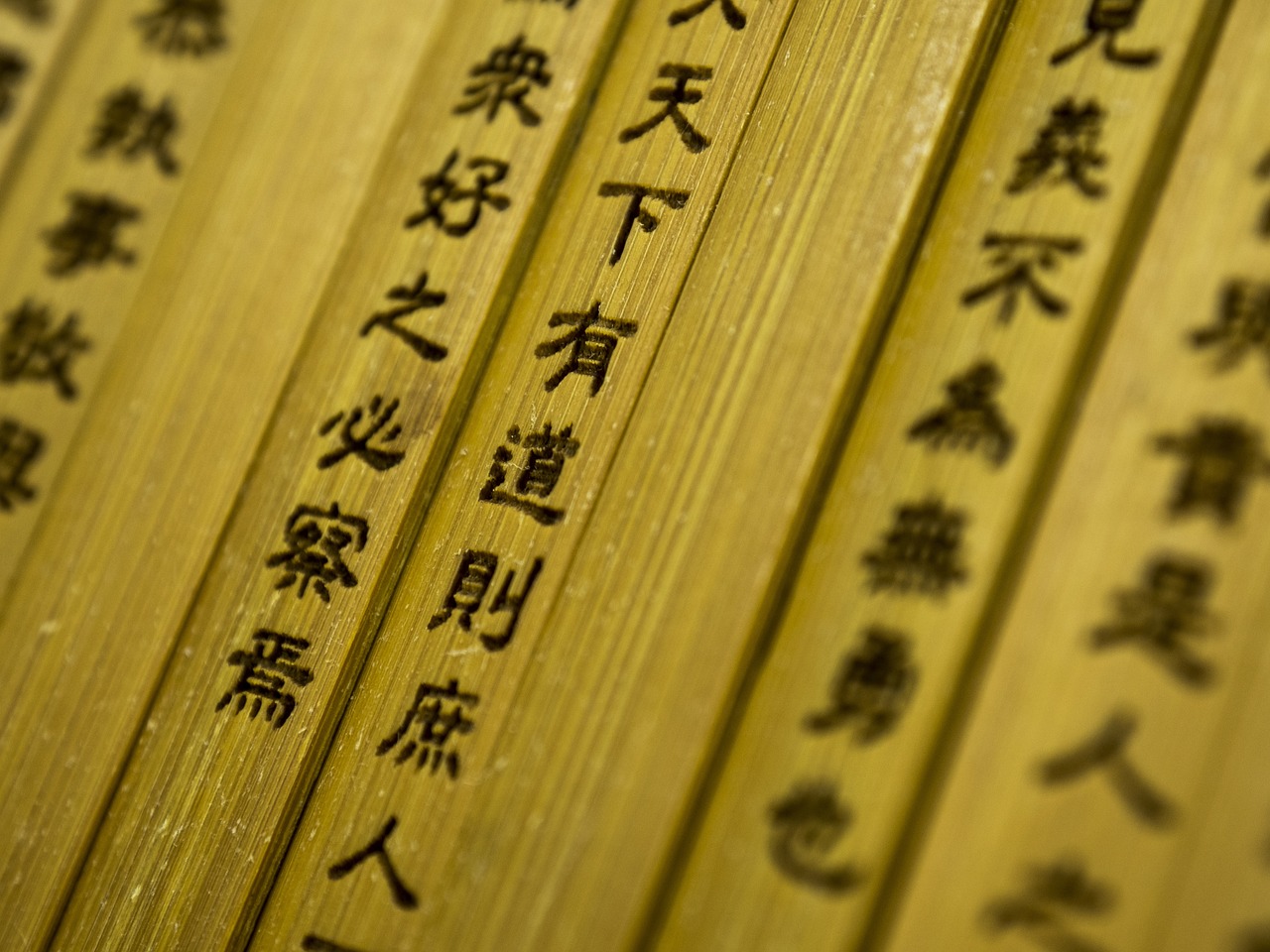
The Importance of Moral Education
Moral education is more than just a topic of discussion; it's a cornerstone of Confucian philosophy that resonates deeply in today’s world. Confucius believed that the cultivation of virtue is essential not only for individual growth but also for the overall harmony of society. Imagine a world where individuals are guided by strong ethical principles—this is the vision that Confucius championed. He argued that moral education should be integrated into all aspects of learning, ensuring that students not only acquire knowledge but also develop a strong sense of right and wrong.
At its core, moral education is about nurturing values such as integrity, compassion, and responsibility. These values serve as a compass, guiding individuals in their decisions and interactions. Confucius emphasized that the role of educators goes beyond imparting academic knowledge; they must also act as moral exemplars, demonstrating the virtues they wish to instill in their students. This approach fosters an environment where students can learn not just through textbooks but through the lived experiences and actions of their teachers.
Furthermore, moral education is not limited to the classroom. It extends into the community and family, creating a holistic approach to character development. For instance, Confucius advocated for the importance of role models in a child's life. Parents, teachers, and community leaders play a pivotal role in shaping the moral fabric of the younger generation. When children observe ethical behavior in their surroundings, they are more likely to internalize these values and carry them into adulthood.
To illustrate the significance of moral education, consider the following table that outlines the key values promoted by Confucius and their impact on society:
| Core Values | Impact on Society |
|---|---|
| Benevolence (Ren) | Fosters empathy and compassion among individuals, leading to a more harmonious community. |
| Righteousness (Yi) | Encourages individuals to act justly, promoting fairness and equity in society. |
| Propriety (Li) | Instills respect for traditions and social norms, enhancing social cohesion. |
| Wisdom (Zhi) | Guides individuals in making informed decisions, contributing to a well-informed citizenry. |
In today's context, the importance of moral education cannot be overstated. With the rise of technology and social media, young people are exposed to a myriad of influences that can either uplift or undermine their moral development. Thus, instilling a strong ethical foundation is crucial to navigating these challenges. Confucius’s teachings remind us that moral education is a lifelong endeavor that must adapt to the changing landscape of society while remaining anchored in core ethical principles.
Ultimately, the legacy of Confucius in moral education serves as a powerful reminder that we are all part of a larger tapestry. Each thread represents an individual, and when woven together with strong moral fibers, we create a resilient and vibrant community. It’s not just about teaching young minds to think critically; it’s about nurturing their hearts to act kindly and responsibly. This balance of intellect and ethics is what will lead to a brighter, more compassionate future for all.
- What is the main focus of Confucian moral education? Confucian moral education focuses on cultivating virtues such as integrity, compassion, and responsibility in individuals to promote societal harmony.
- How can educators implement moral education in their teaching? Educators can implement moral education by acting as role models, integrating ethical discussions into the curriculum, and encouraging students to reflect on their values and actions.
- Why is moral education important in today's society? In today's fast-paced and often chaotic world, moral education is crucial for helping individuals navigate ethical dilemmas and contribute positively to their communities.
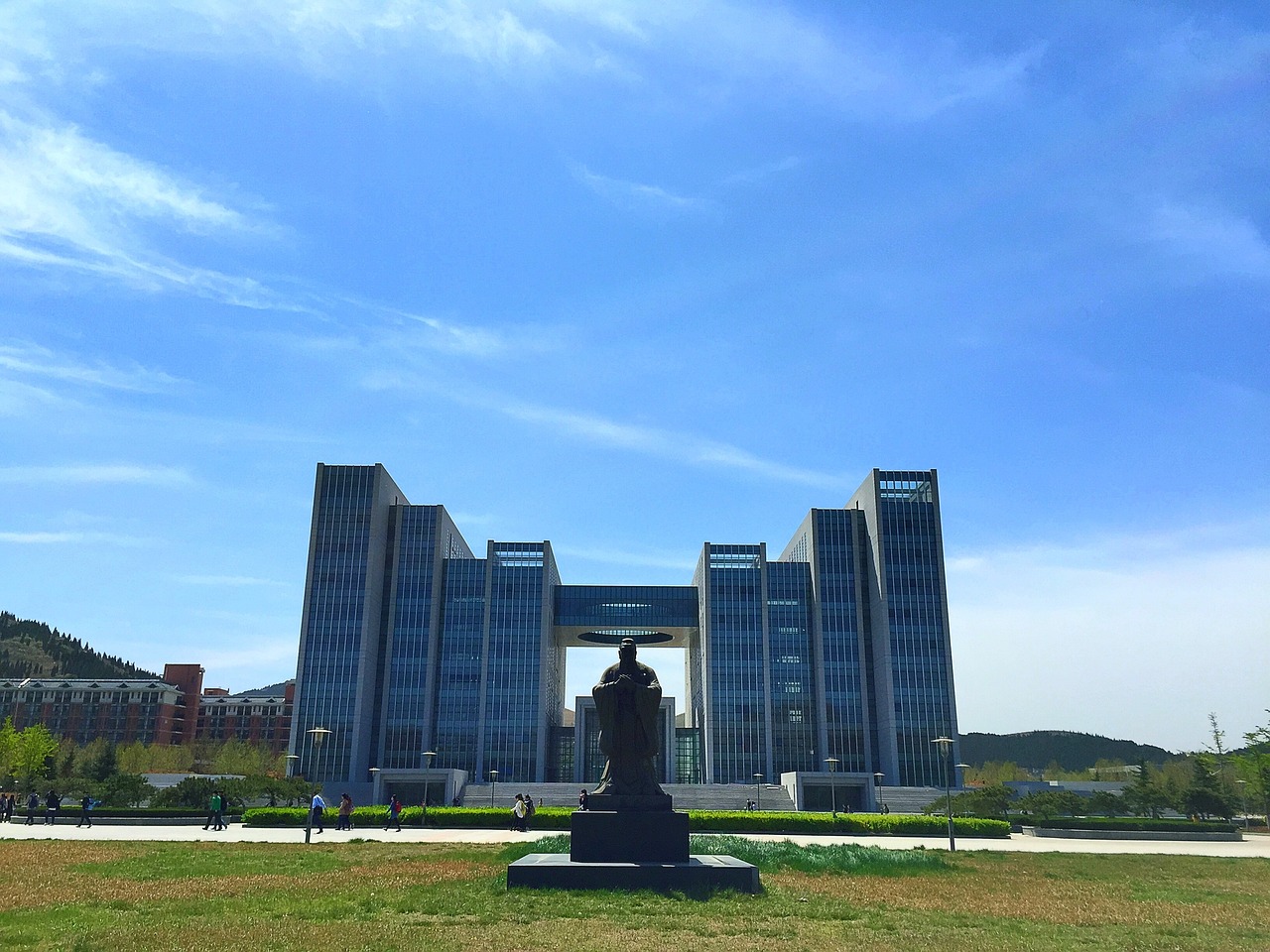
Confucius's Influence on Modern Education
Confucius's teachings have transcended time and geography, leaving a remarkable imprint on modern education systems around the world. His belief that education is a lifelong journey resonates deeply in today's society, where continuous learning is increasingly valued. Confucius famously stated, "Education breeds confidence. Confidence breeds hope. Hope breeds peace." This sentiment encapsulates the essence of his educational philosophy, which emphasizes not just the acquisition of knowledge but the development of character and moral integrity.
In contemporary classrooms, we can see the echoes of Confucian principles in various educational practices. For instance, the emphasis on critical thinking and ethical reasoning mirrors Confucius's insistence on questioning and understanding rather than rote memorization. This approach cultivates a generation of learners who are not just passive recipients of information but active participants in their education. By fostering an environment where students are encouraged to think independently, educators are upholding Confucius's vision of a well-rounded individual.
Moreover, Confucius's focus on moral education is profoundly relevant today. In an age where ethical dilemmas abound, integrating moral philosophy into the curriculum can guide students in navigating complex social issues. Schools that prioritize character education help students develop empathy, respect, and responsibility—values that are essential for harmonious living in a diverse society. As Confucius himself said, "The man who moves a mountain begins by carrying away small stones." This metaphor illustrates that nurturing virtue and moral integrity is a gradual process that requires patience and persistence.
Additionally, the concept of community learning is another aspect where Confucius's influence is evident. His teachings highlight the importance of relationships and social bonds, encouraging collaborative learning environments. Modern educational frameworks often incorporate group projects and peer learning, reflecting Confucian ideals of cooperation and mutual support. This not only enhances academic performance but also promotes social skills and emotional intelligence among students.
To illustrate the impact of Confucian philosophy on education, consider the following table that highlights key aspects of his teachings and their modern applications:
| Confucian Teaching | Modern Application |
|---|---|
| Importance of Moral Education | Character education programs in schools |
| Value of Lifelong Learning | Continuing education and adult learning initiatives |
| Encouragement of Critical Thinking | Project-based learning and inquiry-based education |
| Emphasis on Community and Relationships | Collaborative learning and peer mentoring |
In conclusion, the influence of Confucius on modern education cannot be overstated. His teachings remind us that education is not merely about academic success but also about cultivating a sense of responsibility towards oneself and society. As we continue to navigate the complexities of the modern world, embracing Confucian philosophies can lead to more compassionate, thoughtful, and well-rounded individuals. After all, isn't it our duty to ensure that the next generation is equipped not just with knowledge but with the wisdom to use it wisely?
- What are the main principles of Confucian education?
The main principles include moral education, the importance of lifelong learning, and the cultivation of virtues such as respect and empathy.
- How does Confucianism influence modern educational practices?
Confucianism influences modern education by promoting critical thinking, character development, and collaborative learning environments.
- Is Confucian education relevant today?
Yes, Confucian education is highly relevant today as it addresses ethical dilemmas and fosters social responsibility in students.
Frequently Asked Questions
- What are the core teachings of Confucius?
Confucius emphasized key virtues such as benevolence, righteousness, and propriety. These principles form the backbone of his ethical system, guiding individuals in their personal conduct and interactions with others. By promoting these virtues, Confucius aimed to cultivate a harmonious society where everyone acted with moral integrity.
- How does the concept of Ren influence personal relationships?
Ren, or humaneness, is all about empathy and compassion. It encourages people to treat others with kindness and understanding, fostering strong social bonds. When individuals practice Ren, it leads to deeper connections and a more supportive community, ultimately enhancing the quality of interpersonal relationships.
- What role do rituals (Li) play in Confucian philosophy?
Rituals, or Li, are essential for maintaining social order and cultural identity. They provide a framework for appropriate behavior in various situations, helping to instill a sense of respect and responsibility among individuals. By participating in rituals, people reinforce their connections to their culture and community, contributing to societal harmony.
- Why is education important in Confucian thought?
Education is viewed as a lifelong journey in Confucianism. Confucius believed that learning is not just about acquiring knowledge but also about cultivating virtue and character. Through moral education, individuals can develop the qualities necessary for personal growth and contribute positively to society.
- How has Confucius influenced modern education?
Confucius's teachings have left a lasting impact on contemporary educational practices. His emphasis on critical thinking, ethical reasoning, and character development continues to resonate in schools today. By focusing on the holistic development of students, educators aim to prepare them not just academically, but also as responsible and moral citizens.

